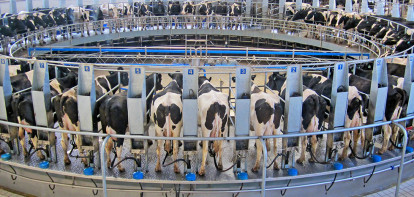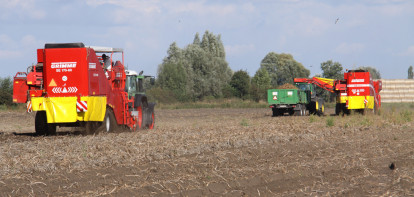Analysis Crops
The Polish farmer is up to his neck in water
Farmers in Poland are facing financial difficulties. The prices for wheat, corn, and rapeseed have been in a downward trend for months, while the costs remain high. The dairy industry is also under pressure. This is causing smaller farms, up to 100 hectares, to operate at a loss and struggle to stay afloat. Meanwhile, one gap is being filled with another.
2022 already feels distant for farmers in Poland. The sky seemed to be the limit. Rapeseed prices up to €1,080 per ton (45% above the five-year average) and milling wheat at €430 per ton. That is even double the average on the Matif in Paris. The war in Ukraine caused chaos in the international markets. However, that same war is now exerting a strong downward pressure. Polish farmers are feeling the full impact. After all, a lot of wheat, corn, rapeseed, and sunflower seeds cross the Ukrainian-Polish border.
Prices are picking up
Until mid-March, grain and rapeseed prices plummeted. They have since rebounded slightly, but it's not much. Converted, arable farmers are paid an average of €147 per ton for feed wheat and €173 for milling wheat on the physical market. Rapeseed has risen from €392, mid-March, to €414 per ton by the end of April.
The damage has already been done for the small Polish farmer. Many products have been sold. Companies that could afford to wait have sold at a market low. Other companies have waited, resulting in significant inventories. This, in turn, exerts pressure on the market. Meanwhile, a steady stream of products continues to cross the border. This is one of the reasons why there is great dissatisfaction among farmers, leading to significant protests, especially earlier this year.
Subsidized grain
It is up to the newly appointed Prime Minister Donald Tusk – who has held this position since December with his party Platforma Obywatelska (Civic Platform) – to address the situation for farmers. On April 25, more details were revealed about his support package for farmers. Not all details are known, but it is clear that companies will receive €46 or €70 per ton of wheat or barley, depending on the period in which they sold their product (before or after March 1). Financial support per ton of rapeseed and corn is also forthcoming. Furthermore, the government is considering measures to support the pig farming industry and aid farmers affected by recent frost, as reported by Polish media quoting Agriculture Minister Czesław Siekierski.
With this support, the government hopes that farmers will abandon their protest actions. An initial success has already been achieved. The last border blockade – ongoing since February 7 – was lifted today (April 29), and new previously announced actions are on hold.
While the new Polish government announced these measures, the European Parliament in Brussels voted on the extension of duty-free imports of Ukrainian agricultural products. Since the war, import duties on, among others, wheat, corn, sugar, and eggs have been lifted. On April 25, the Parliament voted to extend the measure by a year, after it expires on June 1. This is a sore point for Poland, which believes it undermines its agricultural sector.
No reserves
For Polish arable farmers, the announced support measures are a temporary solution. It is mainly the (by Polish standards) smaller farms (up to 100 hectares) that are facing deep financial troubles. In 2022 and 2023, they had to purchase expensive fertilizers and crop protection products, while the selling prices of their products have significantly dropped. Therefore, suppliers have pre-financed these inputs and are left with a gap in their budget. Meanwhile, the costs for the current growing season have already been incurred and must also be purchased on credit. Financial reserves, which could be built up in 2022, have long disappeared. Not least because farmers have been tempted to buy expensive new tractors, combines, or machinery.
For suppliers of fertilizers, seeds, and crop protection products, the situation is a delicate matter, as an insider tells Boerenbusiness. In cases of financial stress, the supplier places a mortgage on the land to ensure that the company receives its money in case the sales results do not cover the costs. This means an exit strategy for these companies is further away than ever, unless product prices undergo a significant increase.


